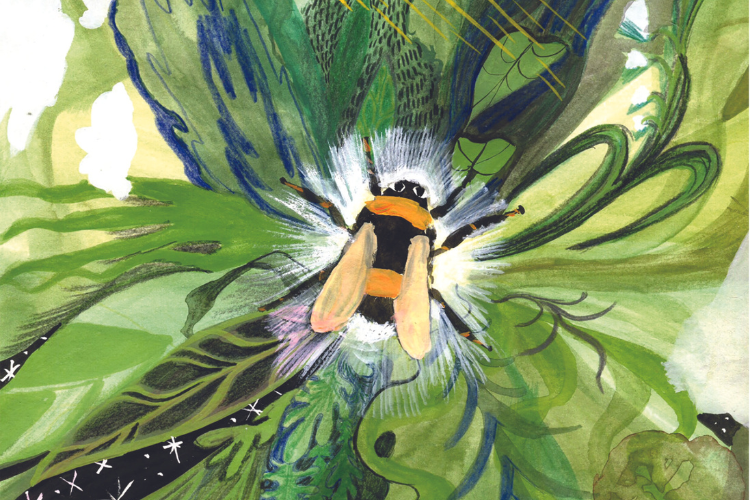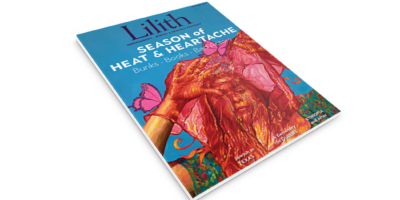
ART: ALEX ALDRICH BARRETT, ALEXALDRICHBARRETT.COM
Camp Goes to School
If you’re wondering if you are currently, or have ever been, involved in an immersion experience, here are some ways to tell (in no particular order):
You’re away from your normal life—not necessarily geographically, but in a different environment.
Time seems to work in a way that it doesn’t in the “real” world—it slows down, speeds up, a day feels like a year, a month feels like a week.
The people around you, regardless of age or role, feel like family, or at least label themselves and your group as such.
The rules inside the experience aren’t the same as those outside of it, and when you leave, there might be a rocky period of adjustment as you attempt to return to normal.
This list might seem familiar to those who have worked in Jewish education, and especially in the world of Jewish camping, which until now, has remained relatively unexplored from a historical and academic standpoint. Sandra Fox’s Jews of Summer: Summer Camp and Jewish Culture in Postwar America (Series: Stanford Studies in Jewish History and Culture, February 2023, $28.00) investigates the past and present of Jewish camping through the lens of the historical moment in which camping became a thing—the thing—for Jewish families in America. In the wake of the Holocaust, the Cold War, the Sexual Revolution, the pressures to assimilate solidly into American life, modern moral conflicts with Israel and Zionism.
If you never went to Jewish camp (I’m in that group), Fox’s book proves useful in explaining what happens to a place when young people devote their summers and their identities to it These “islands of Judaism” have been compelled to contort and adapt to the circumstances of the young people who spent their summers there, influencing the way prayer, history, and sexuality (among other things) were and are approached at camp.
For instance, a 1963 study of sixty-one Jewish summer camps revealed that 32 percent included prayer as a fundamental part of their morning routines. At Ramah, the camping arm of the Conservative movement, as well as at Reform movement camps, prayer wasn’t a rote experience, but one in which campers were encouraged by counselors to find their own meaning. The catalyst for this more experimental approach to prayer (including more gender inclusivity) was likely the result of counselors’ involvement in the Havurah movement at home, which they sought to replicate at camp. “The younger generation’s approach to gender also made Ramah’s morning prayer services more egalitarian than the Conservative movement from which it emerged,” writes Fox. In spite of what was happening at camp, the Conservative movement lagged behind in gender equality. Rabbinic ordination for women didn’t come to fruition until 1984.
Anxiety about that old bugbear, Jewish continuity, particularly intermarriage, dictated much of camp programming for decades. In spite of efforts by camp administration to craft young Jews who would adhere to the values presented to them at camp, even when they were out side the bubble, the truth, Fox writes, was that “camp leaders could never ensure it…and the unity that they worked to build did not win over every child.”
At Zionist summer camps, where pride in and allegiance to Israeli culture and history made up the curriculum, campers would meld into secular college campuses and get conflicting information about the Israel which they’d been taught to revere and aspire. The result is a movement, led by alumni/ae of Jewish summer camps, to foreground a complicated Israeli reality, especially IfNotNowWhen’s #YouNeverToldMe campaign. In addition to this pushback against a mandatory Zionism, Fox highlights campers whose mission has become to challenge the centralization of Israel in Jewish life, choosing learning, Yiddish language and culture, and the notion of dokayt, Yiddish for “hereness,” or diasporaism. Fox’s book is fairly unique in its thorough attention to the Yiddish camping movement alongside the denominations’ camping movements. “These organized and public protests mark a significant turn in the history of Jewish summer camping,” Fox writes, “pointing to yet another way in which campers and counselors may end up altering the agendas of camps in the years to come.”
Instead of sexual experiences at camp, they spent nights overhearing the stories of their bunkmates and feeling left out of what felt like essential coupling.
In addition to the politics of camp, Fox goes right into the elephant in the cabin—sexuality at Jewish summer camp. “Compulsory heterosexuality” (a term coined by feminist author and poet Adrienne Rich) long dominated camp culture, and at the same time, several interviewees admitted to Fox that instead of sexual experiences at camp, they spent nights overhearing the stories of their bunkmates and feeling left out of what felt like essential coupling, an atmosphere of pressure that has recently been dissected in youth movements and Birthright trips, among other youth programming.
Under the ever-looming specters of assimilation and intermarriage, forming romantic relationships at camp was encouraged by staff, Fox tells us. “Messaging surrounding Jewish marriage was also pervasive in the more implicit or “hidden curriculum” of camp culture. A male camp director and his wife, for instance, provided a Jewish family structure for the entire camp to observe and internalize.” At the end of the book, we’re reminded that although some campers have voiced criticism about a bottomless obsession with heterosexual Jewish continuity, platforms like RamahDate (a dating site for those affiliated with Camp Ramah) continue to perpetuate it.
While Jews of Summer is a unique primer on Jewish camping, and a heartening confirmation of the power of young Jews and their ability to disrupt and change, it doesn’t cover the issue of abuse. But Stephen Mills’ Chosen: A Memoir of Stolen Boyhood (Metropolitan Books) depicts a Jewish camp experience dominated by fear, trauma, secrecy, and a shame yet to be fully owned by the Jewish community. When Mills arrived at UJA-Federation’s Camp Ella Fohs in New Milford, Connecticut, in the summer of 1968, he was seized upon by camp director Dan Farinella, a social worker whose charisma and convictions about social justice provided cover for the sexual abuse of countless young boys, including Mills. In perpetual mourning over the loss of his father, who died of multiple sclerosis when Mills was five, and struggling with his mother’s insistence on erasing her dead husband’s existence, Mills is a vulnerable thirteen year old. He’s elated when Farinella selects him to be a confidante. “I felt special, like we were on a secret mission,” he writes.
Over the course of two years, Farinella works his way into Mills’s family’s favor, favoring MIlls with trips and other opportunities while he continues to rape him. In order to survive, Mills displaces the experiences, managing to convince himself that Farinella is a friend with whom he has a peculiar, yet valuable relationship. As a reader, we watch him disappear into a world of his own, frustrated and perhaps astonished at the depth of his displacement, and when he emerges, after years of trying to escape his literal nightmares, it’s into a process of healing that will continue for his entire life. In case you’re feeling inclined to pass on Chosen because you’ve had your fill of stories of childhood sexual abuse, know this: it is not one. “I don’t want my life reduced to episodes of sexual assault that occurred half a century ago,” Mills writes. This is a memoir that glimmers, and not just because of Mills astonishing ability to make words jump from the page while crafting an excavation of his trauma. By revealing his story and allowing others to do the same, Mills shows us that what we’d like to believe isn’t true about Jewish communities is, in fact, verifiable. How did Farinella manage to abuse so many boys for so long? How, in spite of suspicion by campers, staff, and even parents, did he continue to move from camp to camp, state to state? Why didn’t anyone say anything when they saw with their own eyes things that didn’t sit right?
One answer lies in those persistent perceptions of masculinity, writing off behavior like groping boys in the pool as “horseplay,” instead of daring to think it was anything inappropriate, the denial that Farinella, someone regarded as a “visionary” (how Mills himself described him to his college girlfriend), could be a predator. The fact that he was one remained an open secret. “Certainly,” writes Mills, “the campers and staff at Ella Fohs knew that Farinella targeted boys for improper attention and brazenly groped them. Many Ella Fohs employees—waiters and kitchen boys—knew much more than that. They were victims themselves.” There are Jewish organizations that are part of the system that allowed Farinella, and others like him, to commit these crimes, and they must be taken to task to stop the machine in its tracks. We have a long way to go towards restitution. In fact, when Mills’ memoir won the Jewish book award, he tweeted, it was omitted from awards coverage in several major Jewish newspapers, which mentioned other awardees. In an article in eJewish Philanthropy, he described how his lawsuit against these camps and their umbrella organizations were met by the “playbook of the Catholic Church.” Individually and in concert, Jews of Summer and Chosen should be required reading. The fact that one is an academic work and the other a memoir makes them even more essential; each is a compliment to the other, a past to be reckoned with and a future for the shaping.
Chanel Dubofsky is a writer in Brooklyn, and appears in the documentary My So Called Selfish Life, about the choice to be childfree.


